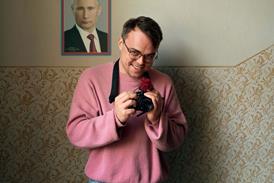Dir: Diego Arsuaga. Uruguay/Argentina/Spain. 2002. 93 mins.
Faintly reminiscent of an Ealing Studio's comedy (The Titfield Thunderbolt springs particularly to mind), Uruguay's Oscar candidate is a gentle caper movie about a gang of old codgers who hijack a steam train. International critics are likely to turn their noses up at this cosily old-fashioned piece, which went home empty handed from the competition at the Havana Festival Of New Latin American Cinema (although it fared better a few months earlier in both Valladolid, where Arsuaga was named best new director and Montreal, where it won best screenplay). Still, the popular response to the film from Cuban audiences, and a strong cast led by top Argentine actors Federico Luppi and Gaston Pauls, indicate decent commercial prospects in Spanish-speaking territories. After four weeks at the Spanish box office, the film has taken $450,000 and is playing on 43 screens. Elsewhere, where the film goes under the title of Heart Of Fire (Corazon De Fuego) and Railway Sleepers (Los Durmientes), box office is likely to be restricted to specialist arthouse audiences.
Incensed at the announcement that a magnificent historic locomotive called Heart of Fire is about to be sold to a Hollywood studio, three retired railway workers resolve to do something about it. Stealing the train by night and adorning it with a banner reading "Our Patrimony Is Not For Sale", they blaze off along disused branch lines through some glorious countryside, with the media and a police posse, led by Gaston Pauls, in hot pursuit.
The train-nappers seem like an absurdly ineffectual bunch: they comprise a guy known as The Professor (Hector Alterio), who has a dicky heart, Dante (Jose Soriano), who suffers from bouts of senile dementia, and Pepe (Luppi), who bores everyone else with a stream of bogus war stories. Also along for the ride is a small boy, Guito, who proves himself invaluable as the only gang member who knows how to use a mobile phone.
Gradually, the band is eroded. Guito reluctantly leaves the train when the men are accused of abducting him, soon followed by Dante, whose forgetfulness makes him an increasing liability. But the police's efforts to halt their progress are consistently thwarted, after the men become elevated into folk heroes and are aided and abetted by everyone they meet along the way.
The screenplay is co-written by the star Spanish writer-director Fernando Leon de Aranoa, and the focus of his other work (Barrio, The Back Of The World and this year's Spanish Oscar contender Mondays In The Sun) can be dimly detected in the background. Its story touches lightly on such themes as national pride and resistance to American domination, the recovery of personal dignity by the trio of elderly, sidelined workers, and the impact of the closing of railway services on Uruguay's rural communities.
However these social issues take strictly second place to character-led drama, involving much physical comedy and many a voluble shouting match. Highbrow viewers will regard the result as unsophisticated and thoroughly sentimental. But The Last Train benefits from some very solid performances and professional cinematography and editing. Hugo Jasa's jolly, traditionally styled music complements an unassuming but polished package.
Prod cos: Patagonik Film Group, Rambla Producciones, Telefe, Tornasol, Taxi Films
Sp dis: Alta Films
Int'l sales: Tornasol
Exec prod: Oscar Kramer, Carlos Gonzalez, Mariela Besuievsky
Prods: Jose Sanchez Varela, Carlos Mentasti, Pablo Bossi, Oscar Kramer, Herrero
Scr: Diego Arsuaga, Beda Docampo Feijoo, Fernando Leon de Aranoa
Cinematography: Hans Burman
Prod des: Ines Olmedo
Ed: Fernando Pardo, Daniel Marquez
Music: Hugo Jasa
Main cast: Federico Luppi, Hector Alterio, Pepe Soriano, Gaston Pauls

















No comments yet